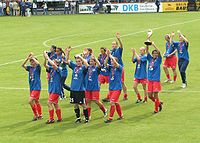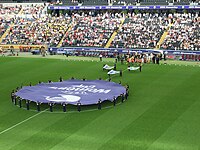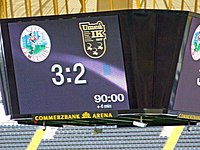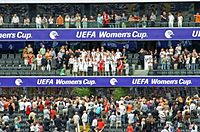UEFA Women's Champions League
 | |
| Founded | 2001 |
|---|---|
| Region | Europe (UEFA) |
| Number of teams | 59 |
| Current champions | |
| Most successful club(s) | |
| Website | Official website |
The UEFA Women's Champions League, previously called the UEFA Women's Cup (2001–09), is an international women's association football competition. It involves the top club teams from countries affiliated with the European governing body UEFA.
The competition was first played in 2001–02 under the name UEFA Women's Cup, and renamed the Champions League for the 2009–10 edition. The most significant changes in 2009 were the inclusion of runners-up from the top eight ranked nations, a one-off final as opposed to the two-legged finals in previous years, and – until 2018 – playing the final in the same city as the men's UEFA Champions League final.
Lyon is the most successful club in the competition's history, winning the title five times.
Contents
1 Format
1.1 UEFA Women's Cup
1.2 Champions League
2 Prize money
3 Records and statistics
3.1 Winners
3.2 By nation
3.3 Top scorers by tournament
3.4 All-time top scorers
4 Gallery
5 See also
6 References
7 External links
Format
UEFA Women's Cup

Former UEFA Women's Cup logo
A preliminary round was played to reduce teams to 32, in the first season only two teams played a two-legged match, the following seasons were played as four team mini-tournaments which had the winner advance to the group stage. Teams were then divided into eight groups of four. The groups were played again as mini-tournaments at a single location over the course of five days. The group winners then advanced to the quarter-finals. The knock-out rounds were played as two-legged. That included the final which was only played as a single leg in 2002.
For the 2004–05 season the group stage was played in four groups with the top two teams advancing to the quarter-finals. That resulted in more qualifying groups.
Champions League
On 11 December 2008, UEFA announced that the competition would be reformatted and renamed to the UEFA Women's Champions League.[1] As in the men's game, the new tournament aims to include runners-up of the top women's football leagues in Europe,[2] and the final is to be played in a single match.
On 31 March 2008 UEFA confirmed that the eight top countries according to the UEFA league coefficient between 2003–04 and 2007–08 would be awarded two places in the new Women's Champions League.[2] These leagues were:
Bundesliga, Germany
Damallsvenskan, Sweden
Women's Premier League, England
Division 1 Féminine, France
3F Ligaen, Denmark
Top Division, Russia
Toppserien, Norway
Serie A, Italy
While seven of the above associations have held a top eight spot until today several associations have entered the top eight. Due to coefficient changes ahead of 2010–11, Iceland gained a place in the top eight, at the expense of Norway. In 2012–13, Norway regained its top-eight place at Iceland's expense. Then, for 2013–14, Austria replaced Norway in the top eight. The Czech Republic replaced Austria in the top eight for 2014–15.[3] In the current edition the Czech Republic itself is replaced by Spain.[4]
Also in 2012–13, the berth for England's champion passed from the Women's Premier League to the country's new top level, the WSL. The following year, after the merger of the Belgium and Netherlands top divisions into a single binational league, the berths for those countries passed to the top team from each country in the new league.
The title holder has the right to enter if they do not qualify through their domestic competition, and will start in the round of 32.
The competition is open to the champions of all 55 UEFA associations. However, not all associations have or have had a women's league. For instance Andorra, Liechtenstein, San Marino and Gibraltar have never participated.
Due to the varying participation, the number of teams playing the qualifying round and teams entering in the round of 32 change from year to year.
Below is shown the number of teams starting in each round, given between 51 and 57 participants. The principles are inferred from the access list:[5] Numbers are based on three principles:
- Groups of 4 teams shall contest the qualifying rounds.
- The group winners shall qualify for the main round.
- The smallest possible number of qualifying group runners-up shall qualify for the main round.
| Teams | Round of 32 | Qualifying | Groups | Adv. Runners-up |
|---|---|---|---|---|
| 54 | 22 | 32 | 8 | 2 |
| 55 | 23 | 32 | 8 | 1 |
| 56 | 24 | 32 | 8 | 0 |
| 57 | 21 | 36 | 9 | 2 |
| 58 | 22 | 36 | 9 | 1 |
| 59 | 23 | 36 | 9 | 0 |
| 60 | 20 | 40 | 10 | 2 |
| 61 | 21 | 40 | 10 | 1 |
Prize money
Prize-money was awarded for a first time in 2010 when both finalists received money. In 2011 the payments were extended to losing semi- and quarter-finalists.[6] The current prize-money structure is
- €250,000 winning team
- €200,000 losing finalist
- €50,000 losing semi-finalists
- €25,000 losing quarter-finalists
In the Champions League teams also receive 20,000 Euro for playing each round or the qualifying. There have been several complaints about the sum, which doesn't cover costs for some longer trips which include flights.[7]
Records and statistics
Winners
| Club | Winners | Runners-up | Years won | Years runners-up |
|---|---|---|---|---|
| 5 | 2 | 2011, 2012, 2016, 2017, 2018 | 2010, 2013 | |
| 4 | 2 | 2002, 2006, 2008, 2015 | 2004, 2012 | |
| 2 | 3 | 2003, 2004 | 2002, 2007, 2008 | |
| 2 | 2 | 2005, 2010 | 2006, 2011 | |
| 2 | 2 | 2013, 2014 | 2016, 2018 | |
| 1 | 0 | 2007 | ||
| 1 | 0 | 2009 | ||
| 0 | 2 | 2015, 2017 | ||
| 0 | 1 | 2003 | ||
| 0 | 1 | 2005 | ||
| 0 | 1 | 2009 | ||
| 0 | 1 | 2014 |
By nation
| Nation | Winners | Runners-up | Semifinalists | Winner | Runners-up | Semifinalists |
|---|---|---|---|---|---|---|
| 9 | 6 | 7 |
|
|
| |
| 5 | 4 | 6 |
|
|
| |
| 2 | 5 | 4 |
|
|
| |
| 1 | 0 | 8 |
|
| ||
| 0 | 1 | 3 |
|
| ||
| 0 | 1 | 0 |
| |||
| 0 | 0 | 2 |
| |||
| 0 | 0 | 1 |
| |||
| 0 | 0 | 1 |
| |||
| 0 | 0 | 1 |
|
Since the format change in 2009, no team from a nation outside the top four, have made the semifinals save for Brøndby in 2015 and Barcelona in 2017.
Top scorers by tournament
The top-scorer award is given to the player who scores the most goals in the entire competition, thus it includes the qualifying rounds. Iceland's Margrét Lára Vidarsdóttir has won the award three times. Ada Hegerberg holds the record for most goals in a season.
| Season | Topscorer (Club) | Goals |
|---|---|---|
| 2017–18 | Ada Hegerberg (Olympique Lyonnais) | 15 |
| 2016–17 | Zsanett Jakabfi (VfL Wolfsburg) Vivianne Miedema (FC Bayern Munich) | 8 |
| 2015–16 | Ada Hegerberg (Olympique Lyonnais) | 13 |
| 2014–15 | Célia Šašić (Frankfurt) | 14 |
| 2013–14 | Milena Nikolić (ŽFK Spartak) | 11 |
| 2012–13 | Laura Rus (Apollon Limassol) | 11 |
| 2011–12 | Camille Abily (Olympique Lyonnais) Eugénie Le Sommer (Olympique Lyonnais) | 9 |
| 2010–11 | Inka Grings (FCR 2001 Duisburg) | 13 |
| 2009–10 | Vanessa Bürki (FC Bayern München) | 11 |
| 2008–09 | Margrét Lára Viðarsdóttir (Valur Reykjavík) | 14 |
| 2007–08 | Vira Dyatel (Zhilstroy-1 Karkhiv) Patrizia Panico (ASD CF Bardolino Verona) Margrét Lára Viðarsdóttir (Valur Reykjavík) | 9 |
| 2006–07 | Julie Fleeting (Arsenal LFC) | 9 |
| 2005–06 | Margrét Lára Viðarsdóttir (Valur Reykjavík) | 11 |
| 2004–05 | Conny Pohlers (1. FFC Turbine Potsdam) | 14 |
| 2003–04 | Maria Gstöttner (SV Neulengbach) | 11 |
| 2002–03 | Hanna Ljungberg (Umeå IK) | 10 |
| 2001–02 | Gabriela Enache (FC Codru Anenii Noi) | 12 |
All-time top scorers
As of 31 October 2018[8] Bold players still active.
| Rank | Topscorer | Goals | Clubs |
|---|---|---|---|
| 1 | 51 | 1. FFC Turbine Potsdam, FC Rosengård, Paris Saint-Germain, Wolfsburg, FC Rosengård | |
| 2 | 48 | 1. FFC Turbine Potsdam, 1. FFC Frankfurt, VfL Wolfsburg | |
| 3 | 46 | Umeå IK, Tyresö FF, FC Rosengård | |
| 4 | 43 | Montpellier, Olympique Lyon | |
| 5 | 42 | Olympique Lyon, FC Rosengård | |
| 42 | Stabæk, Turbine Potsdam, Olympique Lyon | ||
| 7 | 40 | SV Neulengbach | |
| 8 | 39 | Umeå IK | |
| 9 | 38 | Olympique Lyon | |
| 38 | FCR 2001 Duisburg, FC Zürich Frauen |
Gallery

2005 champions

2008 final

2008 final score

2008 champions
2012 final
See also
- FIFA Women's World Cup
- FIFA U-20 Women's World Cup
- FIFA U-17 Women's World Cup
- UEFA Women's Championship
- UEFA Women's Under-19 Championship
- UEFA Women's Under-17 Championship
- FIFA Women's Club World Cup
References
^ "Women's Champions League launches in 2009". 11 December 2008. Retrieved 8 May 2009..mw-parser-output cite.citationfont-style:inherit.mw-parser-output .citation qquotes:"""""""'""'".mw-parser-output .citation .cs1-lock-free abackground:url("//upload.wikimedia.org/wikipedia/commons/thumb/6/65/Lock-green.svg/9px-Lock-green.svg.png")no-repeat;background-position:right .1em center.mw-parser-output .citation .cs1-lock-limited a,.mw-parser-output .citation .cs1-lock-registration abackground:url("//upload.wikimedia.org/wikipedia/commons/thumb/d/d6/Lock-gray-alt-2.svg/9px-Lock-gray-alt-2.svg.png")no-repeat;background-position:right .1em center.mw-parser-output .citation .cs1-lock-subscription abackground:url("//upload.wikimedia.org/wikipedia/commons/thumb/a/aa/Lock-red-alt-2.svg/9px-Lock-red-alt-2.svg.png")no-repeat;background-position:right .1em center.mw-parser-output .cs1-subscription,.mw-parser-output .cs1-registrationcolor:#555.mw-parser-output .cs1-subscription span,.mw-parser-output .cs1-registration spanborder-bottom:1px dotted;cursor:help.mw-parser-output .cs1-ws-icon abackground:url("//upload.wikimedia.org/wikipedia/commons/thumb/4/4c/Wikisource-logo.svg/12px-Wikisource-logo.svg.png")no-repeat;background-position:right .1em center.mw-parser-output code.cs1-codecolor:inherit;background:inherit;border:inherit;padding:inherit.mw-parser-output .cs1-hidden-errordisplay:none;font-size:100%.mw-parser-output .cs1-visible-errorfont-size:100%.mw-parser-output .cs1-maintdisplay:none;color:#33aa33;margin-left:0.3em.mw-parser-output .cs1-subscription,.mw-parser-output .cs1-registration,.mw-parser-output .cs1-formatfont-size:95%.mw-parser-output .cs1-kern-left,.mw-parser-output .cs1-kern-wl-leftpadding-left:0.2em.mw-parser-output .cs1-kern-right,.mw-parser-output .cs1-kern-wl-rightpadding-right:0.2em
^ ab "Women's Champions League details confirmed" (PDF). Retrieved 8 May 2009.
^ "UEFA Women's Champions League association coefficient rankings: places for the 2013/14 season" (PDF). uefa.com. UEFA. Retrieved 7 August 2015.
^ "Access List for the UEFA Women's Champions League 2015/16" (PDF). uefa.com. UEFA. Retrieved 7 August 2015.
^ "Access list for the 2014/15 season" (PDF). UEFA. Retrieved 5 June 2014.
^ "UEFA Women's Champions League factsheet" (PDF). UEFA. Retrieved 21 January 2013.
^ "British teams competing in Women's Champions League receive 'farcical' funding from Uefa". telegraph.co.uk. 6 October 2013. Retrieved 9 October 2013.
^ Anja Mittag on 51, Hegerberg closing: top scorers
External links
| Wikimedia Commons has media related to UEFA Women's Champions League. |
- UEFA Women's Champions League
- UEFA Women's Champions League on Women's Soccer United






